Business in South Korea, Seoul, Korean Companies

South Korean Economy. Shipbuilding, Semiconductors. Foreign Trade of Korea
- Introduction to the Republic of Korea
- South Korean Economy
- Main sectors of the South Korean economy:
- Shipbuilding
- Semiconductors
- Construction
- Digital electronics
- Cars
- International Trade of Korea
- Africa-Korea Partnership
- Investment in South Korea
- Business in Seoul
- Case Study: Business Opportunities in the provinces of South Korea
- Lee Kun-hee - President of Samsung Electronics
- Case Study: South Korean Companies;
- Hynix
- Daehwa
- Samyang
- Daedeok
- Samik
- Valeo Pyeong Hwa
- GM Daewoo
- Access to the South Korean Market
- Business Plan for South Korea
The objectives of the subject “International Trade and Business in Korea” are the following:
- To analyze the South Korean Economy and Global Trade
- To know the trade opportunities in South Korea
- To explore the South Korean trade relations with the country of the student
- To know the South Korean Trade Agreements
- To examine the profile of South Korean businesspeople and enterprises
- To develop a business plan for the South Korean Market

The Subject “Foreign Trade and Business in South Korea” belongs to the following Online Programs taught by EENI Global Business School:
Masters: International Business, Foreign Trade.
Course: Taoism, Confucianism & Business.
- Credits of the subject “Doing Business in South Korea”: 2

- Duration: two weeks
Masters adapted to  Korean Students.
Korean Students.
Global Trade and Business in South Korea
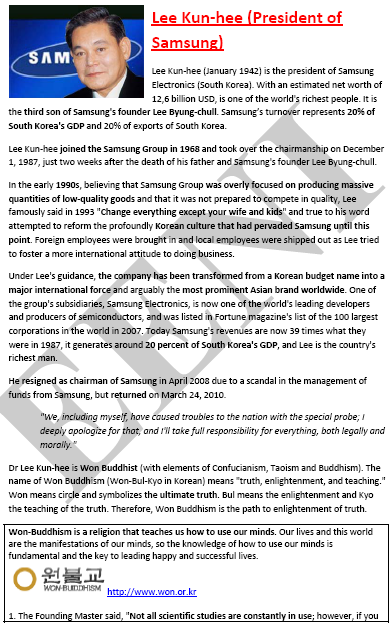
The Republic of Korea: The thirteenth largest economy in the World (by GDP).

- Port of Busan
- Access to the:
- Trans-Siberian Railway (Russia, North Korea)
- Pan-European Corridor II

South Korean Free Trade Agreements.
- South Korea and the Buddhist Economic Area
- APEC
- Asia-Pacific Trade Agreement
- Peru-South Korea Agreement
- Singapore-Korea Agreement
- ASEAN-South Korea Free-Trade Area
- South Korea-Australia Agreement
- South Korea-Vietnam Agreement
- South Korea-New Zealand Agreement
- Canada-South Korea Agreement
- South Korea-Chile Agreement
- U.S.-South Korea Agreement
- Regional Comprehensive Economic Association
- Global System of Trade Preferences
- Trade Negotiations Among Developing Countries
- South Korea-India Economic Partnership Agreement
- EU-South Korea Agreement
- Trade Agreements with the EFTA, Colombia, China, Central America, UK, Turkey, and SACU
- FTAs under negotiation: Mexico, GCC, Colombia
- IORA (dialogue partner)
- ALADI (observer)
- South Asian Association for Regional Cooperation (Observer)
- Trans-Pacific Partnership (CPTPP) - Candidate Country

- WTO
- WCO
- IRU
- TIR Convention
- Guidelines on Safe Load Securing for Road Transport
- BIC (Containers)
- Chicago Convention (ICAO)
- IMO
- Customs Convention on Containers - not a member
- Istanbul Convention - not a member
- Organization for Cooperation between Railways (OSJD)
- ICS
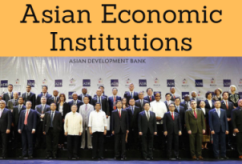
- ESCAP
- Asian Development Bank
- Asia-Middle East Dialogue
- Colombo Plan
- Asia Cooperation Dialogue
- Boao Forum for Asia

- PEEC
- OECD
- OECD anti-corruption measures
- FEALAC
- Asia-Europe Meeting
- African Development Bank
- UN
- WB
- WTO
- IMF
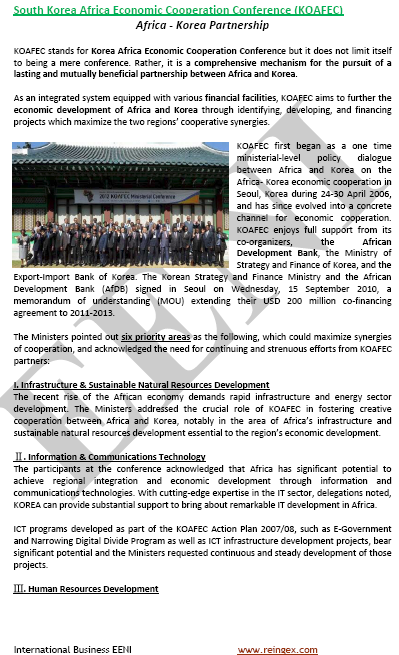
The Republic of Korea
- South Korean population: 49 million people
- Language of South Korea: Korean.
- There are about 75 million people in the World who speak Korean
- Korean is the 13th most spoken language in the World
- Borders of South Korea: Japan, China, Russia, and North Korea
- South Korean Capital: Seoul
- South Korean Area: 100,210 km²
- South Korea is a Presidential Republic
- Independence from Japan: 1945
- Currency of South Korea: Won
- Abolition of Slavery in Korea: 1894
Religion in South Korea.
- From the religious point of view, South Korea is more a “Western” than an Asian Country
- About 50% of the Koreans have no religious preference
- 30% are Christian (18.3% Protestant and 10.9% Catholic)
- 23% are Buddhists (10 million)
- Other minority religions are Islam, Chondogyo (mixture of Buddhism and Christianity), Taoism, and Confucianism

South Korea belongs to the Buddhist Civilization / Sinic Civilization

South Korean Economy.
The Republic of Korea (Asia) successfully transformed itself from a war-torn nation to the thirteenth largest Economy in the World, backed by its leading industries and Foreign Trade.
South Korea is the fourth largest Economy in Asia.
- The Republic of Korea has shown excellence in several sectors: shipbuilding, semiconductors, construction, digital electronics, and cars
- The nuilders of South Korea also shine in the international scenario, especially in the construction market in Asia and the Middle East
- Fourteen firms of South Korea are in the Fortune Magazine's Global 500: Hyundai Heavy Industries, Samsung, Kookmin Bank LG, Hyundai-Kia Motors, SK, Samsung Life Insurance, Hanwha, POSCO, Korea Electric Power Corporation, KT, SK Networks and S-Oil
- The Joint Ventures between Samsung and SONY and LG and Philips are two excellent examples of a productive industrial partnerships in the LCD sector, while the takeover of Daewoo Motors by GM and that of Samsung Motors by Renault stand for success in the automotive industry
- South Korea produces over 3.8 million vehicles every year, led by the five car makers of South Korea: Hyundai Motor, GM Daewoo, Renault Samsung Motors, Ssangyong Motor, and Kia Motors
- South Korea is home to seven of the top ten shipbuilders in the World, including Hyundai Heavy Industries, Samsung Heavy Industries Co., Daewoo Shipbuilding and Marine Engineering Co., STX Shipbuilding and Hanjin Heavy Industries and Construction
- The Republic of Korea (ROK) has built its position as a powerhouse regarding the information technology (IT), backed by its large IT-related production and international trade, world-leading technology development
- Samsung Electronics is the largest computer memory chipmaker in the World, and Hynix Semiconductor is No.1 DRAM and No.3 NAND Flash Memory Producer in the World
- From air conditioners, microwaves, and computers to liquid crystal display screens, companies in South Korea have captured customers' hearts worldwide with better prices and advanced technology
Seoul, the capital of the Republic of Korea, is the economic, financial, and business centre.
- The GDP of Seoul: 193.7 billion dollars
- If the metropolitan areas of the city are included, Seoul represents 47.7% of the Korean GDP
Sample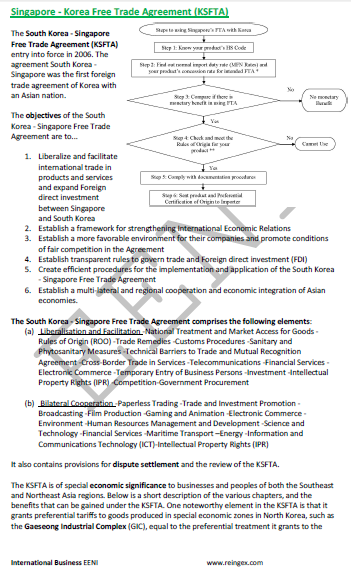

International Trade of Korea.
- South Korea is the eleventh largest global trader in the World with imports and exports accounting for 90% of the GDP of South Korea
- The Republic of Korea ranked tenth in the World regarding the global export market share based on the cumulative export
- South Korea export and import from 220 countries worldwide with the People's Republic of China, Japan, and the U.S. as its largest trade partners
- The main South Korean export markets are the U.S., Canada, Brazil, Mexico, the ASEAN, Japan, China, Singapore, India, Australia, the EU, the UK, France, Germany, Russia, and Saudi Arabia
- The Port of Busan is the fifth-largest container port in the World, having handled a throughput of 13,450,000 TEU (twenty-foot equivalent unit)
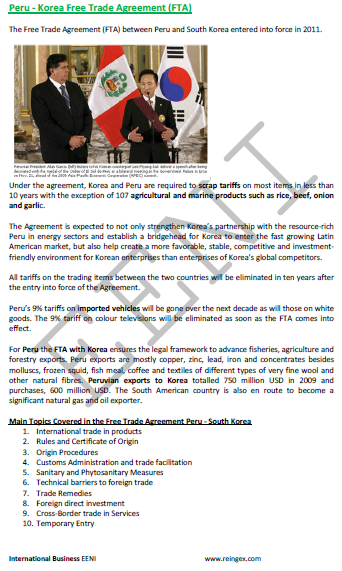
Korean language (석사 무 역 및 국제 마케팅)
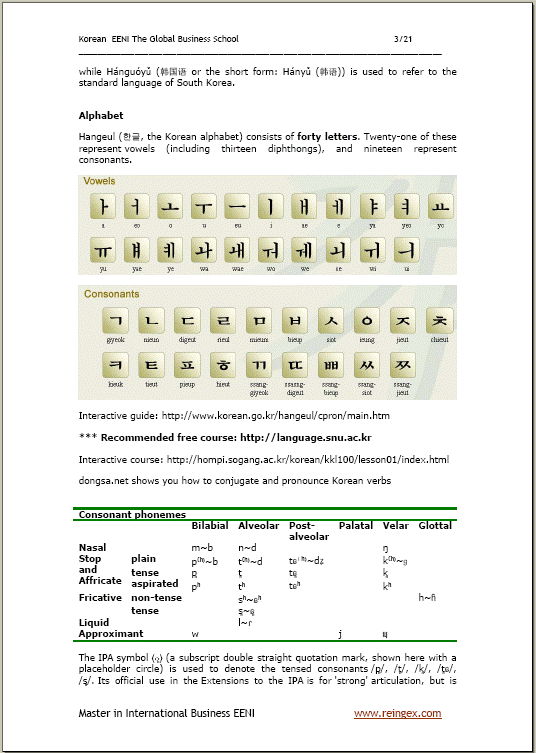
(c) EENI Global Business School (1995-2024)
We do not use cookies
Top of this page




 or
or 
